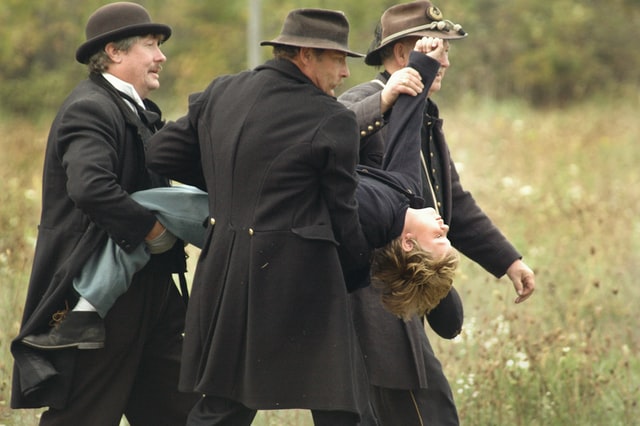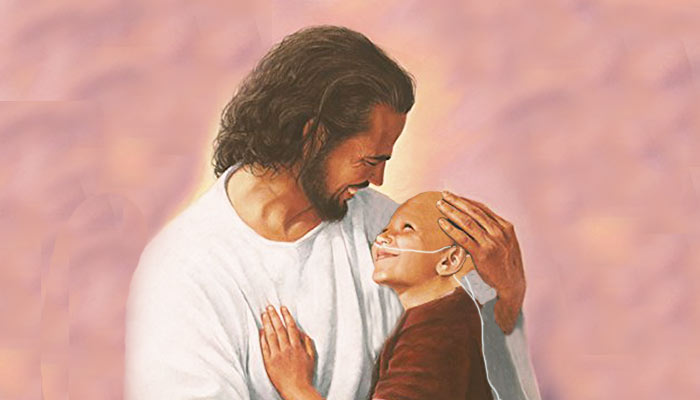When Suffering Never Seems to End
Before the Earth was created, there was an organizer and a plan:
And there stood one among them that was like unto God, and he said unto those who were with him: We will go down, for there is space there, and we will take of these materials, and we will make an earth whereon these may dwell;
And we will prove them herewith [the nature of earth life], to see if they will do all things whatsoever the Lord their God shall command them” (Abraham 3:24-25, Pearl of Great Price).
The earth was created as a proving ground and soon enough a plan was set into motion where ultimately, Eve and Adam would choose the path of knowledge and partake of its fruit. This path includes suffering. So when God cursed the ground, prior to the imminent eviction of Adam and Eve from the Garden of Eden, we can also take Him at His word. Of course, this impacts all of us as children of this courageous couple. Add an irate and jealous adversary along with his followers into the mix—quite literally Hell-bent on thwarting the happiness of these “newly not innocent people”—and the difficulty of mortality increases exponentially. What could possibly go wrong?
Unjust Suffering

Needless to say, suffering will be inevitable. There are so many moving parts in the cycle of living. In his most recent General Conference Address delivered in October 2020, Elder Jeffrey R. Holland acknowledged the degree of difficulty earth life poses and put our most heartfelt questions into words:
How long do we wait for relief from hardships that come upon us? What about enduring personal trials while we wait and wait, and help seems so slow in coming? Why the delay when burdens seem more than we can bear?
No sooner did Elder Holland begin his address than he took us immediately to the exhausting trial of Joseph Smith and his faithful brethren in the bitter Missouri winter of 1838 at Liberty Jail. The new church was only 8 years old and was growing uncomfortably fast for any state or county the Saints relocated to. Northwest Missouri was no exception. There was a great deal at stake on both sides, particularly in 1838.
Due to political influence beyond their control, Presidential and Congressional policies stoked what became known historically as The Panic of 1837: “a financial crisis in the United States that touched off a major depression, which lasted until the mid-1840s. Profits, prices, and wages went down; unemployment went up; and pessimism abounded. … Banks collapsed, businesses failed, prices declined, and thousands of workers lost their jobs.” The prophet bore the emotional brunt of its effects on invested members in Kirkland, Ohio. Offense and anger over soured financial deals led to apostasy, spinning off new and often violent enemies.
Not only this but the welcome mat in Missouri had been removed. An important and heated election was in the making in the newly minted slave state as members of the church, born, raised, and trained in the primarily abolitionist North, and proponents of all men’s freedom threatened to unhinge the already tenuous political balance in Missouri. At this time, voting was not administered by secret ballot. In fact, candidates were on the spot actively campaigning. It was also expected that candidates, or their proxies, would provide alcohol and other incentives to influence and win over voters. To make matters worse, the Federal Government had no legal right to influence or intervene in state matters, let alone state run elections, even if they want to at this point in American history.
From these chaotic elements—including the Saints who justifiably organized themselves to resist and defend themselves—brewed a perfect storm that came to be known as The Mormon War of 1838, which ended with the capture, arrest, and “surrender” of Joseph Smith and 5 companions considered complicit.
So why refer to this particular incident? Joseph was hunted, arrested, and jailed unjustly multiple times. Why do we so often focus here?
The answer is not at all complicated. First, we have a record of it. And the record captures not only the universal pain of unjust suffering, of heartbreaking betrayal, and of miserable physical conditions, but in it we also hear the voice of God, comforting, instructing, and promising hope. Second, in his unjust suffering, we find ourselves. We recognize despair. Elder Holland expresses the sentiment we may have all wondered at certain times of our lives:
“O God, where art thou?” we hear from the depths of Liberty Jail. “And where is the pavilion that covereth thy hiding place? How long shall thy hand be stayed?” How long, O Lord, how long?
To suffer because of disobedience is understandable. To suffer because of obedience can feel intolerable; it feels like the rules are shifting beneath us as we try to find firm ground. In confusion, we ask, “Why does suffering come to the innocent and righteous? Can’t God, the Almighty, the All-knowing, provide now? When will I get what I want? Am I so off? Is it so wrong?! I’m doing everything I can. Why isn’t it working?!” We need perspective. We need counsel and a reason for hope. This, Elder Holland graciously provides:
The answer to such questions is “Yes, God can provide miracles instantaneously, but sooner or later we learn that the times and seasons of our mortal journey are His and His alone to direct.” He administers that calendar to every one of us individually.
We are reminded that God’s wisdom includes God’s timing. This is not a new thought. It is the prophet Isaiah who reminds us that God’s ways and thoughts are not like ours:
For my thoughts are not your thoughts, neither are your ways my ways, saith the Lord.
For as the heavens are higher than the earth, so are my ways higher than your ways, and my thoughts than your thoughts (Isaiah 55:8-9).
Because we function on the earth with limited perspective, missing context, and incomplete knowledge, we are going to feel left in the dark at times. And because we have learned to survive by identifying patterns through cause and effect, it’s natural to feel frustrated and uncomfortable when this order seems to dis-function.
The way will not always be visible and if it is, it may not always make sense. The pattern of God’s response—or lack thereof—could seem unjust and random, especially if we indulge in neighborly comparisons. Of course, there is ample evidence for these seemingly incongruous applications of divine aid and Elder Holland uses scriptural comparisons to illustrate. He compares six stories:
For every infirm man healed instantly as he waits to enter the Pool of Bethesda, someone else will spend 40 years in the desert waiting to enter the promised land.
For every Nephi and Lehi divinely protected by an encircling flame of fire for their faith, we have an Abinadi burned at a stake of flaming fire for his.
And we remember that the same Elijah who in an instant called down fire from heaven to bear witness against the priests of Baal is the same Elijah who endured a period when there was no rain for years and who, for a time, was fed only by the skimpy sustenance that could be carried in a raven’s claw.
The careful study of each story excerpt shows a variety of causes for suffering that don’t follow accepted or predictable patterns of justice. Addressed respectively, they include:
The loneliness of physical disability and poverty like the man waiting at Bethesda’s pool.
The exhaustion and anxiety of not only wandering isolation but also fear of the unknown like the children of Israel fresh out of Egypt.
Liberation, though slow in coming, from prison and cruel persecution despite righteous endeavors like Nephi and Lehi in the book of Helaman.
No liberation, even martyrdom, despite courageous devotion to God, like Abinidi.
Miraculously justified like Elijah among idol-worshipers but then co-suffering during the famine, despite his testimony and warnings, meagerly fed by a crow.
Why are some healed and invited to renewed associations while others wander until they die in an outcast position? Why are some relieved from persecutions when others pay the ultimate price? Why miraculously intervene only later to stand back and let events play out? “My ways [are] higher than your ways,” we’ll try to remember, and keep our faith.
Four Sources of Suffering

Elder Richard G. Scott gives invaluable perspective when we are struggling to evaluate our difficulties and chart a path forward in his October 1995 General Conference talk, “Trust in the Lord.” He teaches:
No one wants adversity. Trials, disappointments, sadness, and heartache come to us from two basically different sources. Those who transgress the laws of God will always have those challenges. The other reason for adversity is to accomplish the Lord’s own purposes in our life that we may receive the refinement that comes from testing. It is vitally important for each of us to identify from which of these two sources come our trials and challenges, for the corrective action is very different.
When we suffer because of disobedience, Elder Scott doesn’t mince words: “the only path to permanent relief … is sincere repentance with a broken heart and a contrite spirit. Realize your full dependence upon the Lord and your need to align your life with His teachings. There is really no other way to get lasting healing and peace.” Got it. Painful but clear.
When we suffer as we practice obedience, or suffer as a direct result of obedience, we can get spiritually disoriented. What’s Elder Holland’s counsel? First, that this is not only unnatural but that it is to be expected: “There will be times in our lives when even our best spiritual effort and earnest, pleading prayers do not yield the victories for which we have yearned, whether that be regarding the large global matters or the small personal ones.” Second, we “work and wait.” He clarifies, “Faith”—the active process of working and waiting—“means trusting God in good times and bad, even if that includes some suffering until we see His arm revealed in our behalf.”
Related: What Is an Abrahamic Test?
I would like to include two secondary sources of suffering as well: 1.) choices of others that negatively affect us, and 2.) imperfection in the natural world. When others make choices that perpetuate behavior which includes abuse, criminal activity, contentions in all their variety, selfishness, and betrayal into our lives, we suffer. Christ was continually up against this in His ministry. His work and influence appeared to Jewish leaders of the day as a direct threat to their comfortable and influential power systems. Those same leaders pretended to religious piety as a cover for persecution and ultimately murder:
And therefore did the Jews persecute Jesus, and sought to slay him, because he had done these things on the sabbath day.
But Jesus answered them, My Father worketh hitherto, and I work.
Therefore the Jews sought the more to kill him, because he not only had broken the sabbath, but said also that God was his Father, making himself equal with God (emphasis added).
Christ knows how this feels: to suffer the effects of another’s deliberate aggression. Regarding suffering that comes from imperfection in the natural world, modern science, in particular, tries tirelessly to compensate for and heal these rifts. Our physical world naturally experiences decay and dissolution. Accidents, weather calamities, normal wear and tear, sickness, genetic defects, and aging also cause degrees of suffering associated with the conditions of mortality. The list is practically endless. Christ confirms that suffering, because of imperfection in the natural world, is not a consistent sign of divine displeasure in John 9:1-4:
And as Jesus passed by, he saw a man which was blind from his birth.
And his disciples asked him, saying, Master, who did sin, this aman, or his parents, that he was born blind?
Jesus answered, Neither hath this man sinned, nor his parents: but that the works of God should be made manifest in him (emphasis added).
The nature of living involves myriad complexities and obstacles, but God’s promise to those who seek Him is “I will not leave you comfortless: I will come to you” (John 14:18). However, He also will not relieve us of the burden of His commands. Comfortingly, it is evident that He is capable of strengthening us to the tasks assigned. The journey of Lehi’s family through their own wilderness reveals a pattern of them growing in ability and strength without relief from the task required of them. Let’s look closely at 2 Nephi 17:1 – 3; 13 – 14 and specifically ask these questions: What suffering did God not remove? How did God provide? What did He want them to know? Why?
And it came to pass that we did again take our journey in the wilderness; and we did travel nearly eastward from that time forth. And we did travel and wade through much affliction in the wilderness; and our women did bear children in the wilderness.
And so great were the blessings of the Lord upon us, that while we did live upon raw meat in the wilderness, our women did give plenty of suck for their children, and were strong, yea, even like unto the men; and they began to bear their journeyings without murmurings.
And thus we see that the commandments of God must be fulfilled. And if it so be that the children of men keep the commandments of God he doth nourish them, and strengthen them, and provide means whereby they can accomplish the thing which he has commanded them; wherefore, he did provide means for us while we did sojourn in the wilderness (emphasis added).
God did not remove the command to Lehi’s family to flee Jerusalem forever. Nor did He remove the injunction to have no fire, causing the family to eat raw meat. They were bearing and raising children all while moving toward another wilderness of ocean. But they were not left comfortless; He strengthened the women physically by providing nourishment through them to their babies despite the caloric demands of their walking. He strengthened them spiritually by relieving their weaknesses which quelled the murmuring. Difficulties don’t disappear, commandments aren’t always revoked, but we can be strengthened. Why does God do this?
Let’s keep looking in verses 13-14:
And I will also be your light in the wilderness; and I will prepare the way before you, if it so be that ye shall keep my commandments; wherefore, inasmuch as ye shall keep my commandments ye shall be led towards the promised land; and ye shall know that it is by me that ye are led.
Yea, and the Lord said also that: After ye have arrived in the promised land, ye shall know that I, the Lord, am God; and that I, the Lord, did deliver you from destruction; yea, that I did bring you out of the land of Jerusalem.
Our faith and testimonies are precious to Him. Through our suffering, God invites us to know Him and to know Him is “life eternal” (John 17:3). We see these same intentions in the story of Alma whose newly baptized believers are under the oppression of wicked men. Where God does not yet promise relief, He grants strength. Pay careful attention to His reasons in Mosiah 24:14:
I will also ease the burdens which are put upon your shoulders, that even you cannot feel them upon your backs, even while you are in bondage; and this will I do that ye may stand as witnesses for me hereafter, and that ye may know of a surety that I, the Lord God, do visit my people in their afflictions.
Eternal Outcomes through Righteous Suffering
 The world stands in opposition to God. When we embrace Him the world opposes us. Part of the comfort God promises, in addition to a more sure faith, is found in a series of verses found in John Chapter 17:
The world stands in opposition to God. When we embrace Him the world opposes us. Part of the comfort God promises, in addition to a more sure faith, is found in a series of verses found in John Chapter 17:
“…that they may be one, as we are.”
“…that the scripture might be fulfilled.”
“…that they might have my joy fulfilled in themselves.”
“…that thou shouldest keep them from the evil.”
“…that they also might be sanctified through the truth.”
“…that the world may believe that thou hast sent me.”
“…that the world may know that thou hast sent me, and hast loved them, as thou hast loved me.”
“…that they may behold my glory, which thou hast given me….”
“…that the love wherewith thou hast loved me may be in them, and I in them.”
All these things He wants to give.
Perhaps instead of condemning God for what we temporarily see as abandonment, we can shift our gaze to stand as witness to our increasing strength physically and spiritually through Christ, “line upon line and precept upon precept, here a little and there a little” (2 Nephi 28:30). To those who seek Him in their suffering, “who hearken unto [His] precepts, and lend an ear unto [His] counsel … they shall learn wisdom; for unto him that receiveth I will give more.”
But be aware. Christ warns that to those who, in their resistant bitterness, metaphorically “curse God and die” (Job 2:9) or “that shall say, We have enough, from them shall be taken away even that which they have. Cursed is he that putteth his trust in man, or maketh flesh his arm” (2 Nephi 28:30-31).
Related: God’s Habit of Defying Expectations
An Invitation to a Higher Perspective about Suffering

How do we reset or realign our expectations regarding our own suffering?
First, we don’t allow our pride to make it personal because we have the wisdom to know that suffering is universal and is associated with both wickedness and righteousness—though for different reasons. Elder Holland, referring to the words of late Elder Neal A. Maxwell suggests:
“… one’s life … cannot be both faith-filled and stress-free.” It simply will not work “to glide naively through life,” saying as we sip another glass of lemonade, “Lord, give me all thy choicest virtues, but be certain not to give me grief, nor sorrow, nor pain, nor opposition. Please do not let anyone dislike me or betray me, and above all, do not ever let me feel forsaken by Thee or those I love. In fact, Lord, be careful to keep me from all the experiences that made Thee divine. And then, when the rough sledding by everyone else is over, please let me come and dwell with Thee, where I can boast about how similar our strengths and our characters are as I float along on my cloud of comfortable Christianity.”
What kind of person is worthy to live with Christ and God the Father? What kind of person inherits the kind of eternal life reserved for Joseph Smith and Emma, Father Abraham and Sarah? What covenants will they have made and kept? What will they have endured? What suffering? What trials of their faith? What abilities would they have developed and how did they come to it? What knowledge would they have? What kind of people are they and how did they arrive at that station?
Christ both asks and answers this question Himself succinctly: “… What manner of men ought ye to be? Verily I say unto you, even as I am” (3 Nephi 27:27).
We cannot predict each sacrifice that will be required, that we suffer before our lives on this earth are ended. We know that we live “in the last days” when “perilous times will come” because of the perversity and gross wickedness of mankind as prophesied with great specificity by Paul in 2 Timothy chapter 3. To give additional comfort and aid, Elder Holland gives an apostolic promise:
While we work and wait together for the answers to some of our prayers, I offer you my apostolic promise that they are heard and they are answered, though perhaps not at the time or in the way we wanted. But they are always answered at the time and in the way an omniscient and eternally compassionate parent should answer them.
And Paul, another Apostle, shares his witness:
Who shall separate us from the love of Christ? shall tribulation, or distress, or persecution, or famine, or nakedness, or peril, or sword?
As it is written, For thy sake we are killed all the day long; we are accounted as sheep for the slaughter.
Nay, in all these things we are more than conquerors through him that loved us.
For I am persuaded, that neither death, nor life, nor angels, nor principalities, nor powers, nor things present, nor things to come,
Nor height, nor depth, nor any other creature, shall be able to separate us from the love of God, which is in Christ Jesus our Lord (Romans 8:35-39).
I share Elder Holland’s hope, “that ‘by and by’—soon or late—those blessings will come to every one of you who seeks relief from your sorrow and freedom from your grief.” Whether relief be granted in this life or in the next, we remain in His capable hands. With all we endure, we are still, faithfully, “waiting on the Lord.”


